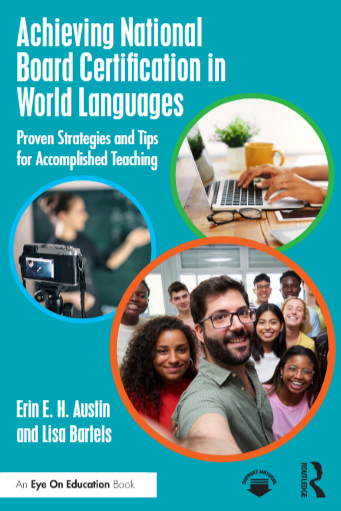Master’s Degree or National Board Certification?
The answer depends on your professional goals and state incentives.
Are you feeling antsy in your career? Do you have a few years’ teaching experience under your belt and want to strengthen your instructional practice? Are you ready to expand your resume in search of more experience, professionalism, or financial benefits?
This blog post is for you!
U.S. Teachers wanting to advance their professional licensure have two major pathways open to them: National Board Certification or a Master’s degree. I’m often asked for advice on which to pursue. The answer depends on your own goals and the nature of the investment you want to make, in terms of:
Our new book, Achieving National Board Certification in World Languages, is coming in February 2026!
Guaranteed Success
Cost
Time investment
Renewal
Financial Benefit
Professional Value
Let’s compare National Board Certification and Master’s degrees in each of these areas. For simplicity, I’ll refer to them as NBC and M.Ed., although the same principles apply to an M.A. or other Master’s degree.
Guaranteed Success
Most determined teachers will be able to successfully complete an M.Ed. program. The requisite skill set (organization, reading ability, study skills) were proven in your Bachelor’s and licensure programs. Of course, you may have to work at it and it might be time consuming, but I don’t normally hear of teachers who are unable to handle their M.Ed. coursework.
NBC is much less of a sure thing. NBC asks candidates to justify each action they take during instruction based on the needs this unique group of students combined with strong teaching pedagogy and subject area expertise. NBC requires a different focus and different style of writing that we often do in our professional lives, and success is not guaranteed. In fact, the pass rate for NBC on the first try is something like 40%. This can be discouraging for strong teachers who don’t achieve certification. I’ve even had colleagues tell me NBC is a scam. I don’t think this is true; usually when a teacher doesn’t achive NBC, it’s because they didn’t structure their lesson or their writing to show what NBC is looking for. However, I do understand the frustration of not achieving NBC when you know you’re a really good teacher.
The winner: Master’s Degree
Cost:
M.Ed.’s are pricey. Here are a few samples of costs for an M.Ed. Program in 2025:
- Indiana Wesleyan University Online (my alma mater) $11,294
- NC State: $15,992
- UCLA $21,115
National Board Certification is much cheaper. (Prices are current as of posting; please refer to www.nbpts.org for the most up-to-date information).
- Annual Registration Fee $75
- (World Language Teachers only) OPI & WPT: around $275
- Cost for each component: $475 (x4)
Minimum Total: $2250
This amount will increase if you take more than one year to complete certification (as most of us do!) or if you need to retake a component. If you were to retake each component once over the course of five years, your cost would be $4450, still a fraction of the cost of an M.Ed.
The winner: National Board Certification
Time investment:
Most M.Ed. Programs run for 18 months to two years, with 20-32 hours of coursework. Working for 18 weeks per semester, a 24 hour program would take 432 hours of work.
NBC is less time consuming – but still not easy. It’s possible to complete NBC in one year, but most candidates take two-three years, and if you have to repeat components it may take up to five.
I estimate I spent 40-60 hours each on Components 2, 3, and 4, another twenty hours or so preparing and taking the Component 1 exam, and let’s say 10 hours dedicated to the OPI and WPT. That comes to about 180 hours of work, before you repeat any components.
The winner: National Board Certification (but don’t mistake this for being easy)
Renewal
M.Ed.’s don’t require any tupe of maintenance or renewal. Once you’ve earned it, it’s yours.
NBC must be renewed every five years, at both time and finiancial cost. (Maintenance of Certification costs a $75 registration fee plus $475 to submit your portfolio). Over 95% of candidates renew successfully, but it’s a process you must stay on top of.
The Winner: Master’s Degree
Financial Benefit:
This depends on your state or school district. In North Carolina, where I teach, there is no pay increase for newly-achieved Master’s Degrees, while National Board Certified Teachers earn a hefty 12% pay increase. In some states it’s the opposite. Here’s a list of current state benefits for NBC, and you should check the incentives in your state for Master’s Degrees before you start your journey.
The Winner: It depends on your state
Professional Benefit
M.Ed.s (and M.A. and M.S. degrees) are perhaps more flexible. You can earn a Master’s Degree in your subject area, in education, in educational leadership, or in another area of interest. The professional benefit may vary based on your program and your own professional goals.
NBC is tightly focused on fostering student achievement through excellent instructional practice. It forces you to take a very deep look into your professional practice and to ensure every decision you make in the classroom is based on solid pedagogy and deep understanding of your students. While the focus is more narrow than an M.Ed., NBC is a professional development experience that will challenge and grow you as an educator.
The Winner: It depends on your goals
So, the final score is:
Master’s Degree: 2
National Board Certification: 2
It depends: 2
In other words, there’s no one-size-fits-all solution here. Check out the options, read about the processes, and confirm the benefits in your teaching locale; then make an informed decision that’s best for your career path.
Which one are you going to try? Share in the comments!




